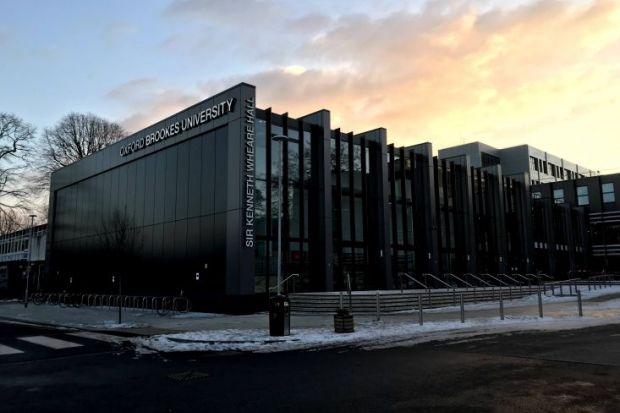Oxford Brookes University is to push on with its plans to close its music and mathematics programmes, despite opposition from academics and sector groups, and an apparent turnaround in its finances.
Vice-chancellor Alistair Fitt informed staff earlier this week that, although a consultation on the plans had received a “large volume of correspondence” related to the closures, “regretfully” the institution had decided to carry on with the process that will see the current cohort of students be the last, with the courses shutting for good in 2026.
Professor Fitt blamed the cuts on external factors including the tuition fee freeze, rising inflation and increases in staff pay and pension contributions, and also on the fact that the courses earmarked for closure were not attracting enough students “to enable them to make the necessary contribution to the university’s overall finances”.
Students held a sit-in demonstration outside the vice-chancellor’s office this week, with a petition against the changes reaching 1,360 signatures.
The local branch of the University and College Union (UCU) has argued that there was no financial need for the cutbacks, pointing at the relatively healthy financial state of the university.
Accounts published last month show that Oxford Brookes made a £4.7 million surplus in 2022-23, overturning a £15.8 million deficit from the year before.
Student numbers were up by more than 1,000 – which the accounts said was largely thanks to a new partnership with Global Banking School – and income also increased in the year by £21 million, with international fees growing by more than £10 million.
Early signs were that enrolment for 2023-24 was also looking healthy, with the accounts stating that Brookes had had a “very successful confirmation and clearing period, when more offers were made and accepted than ever before”. The university declined to comment further.
In his update, Professor Fitt said nine staff members had applied to a voluntary severance (VS) scheme and had been accepted, which had allowed the university to remove the threat of redundancy from some posts. Up to 48 positions were initially thought to be at risk.
“However, despite these staff departures, the savings achieved as a result of VS applications have not been sufficient to achieve the university’s required cost savings of £2 million per annum,” he said.
He added that, of the many suggestions for non-pay cost savings or revenue-generating activities received during the consultation, it had been “regretfully concluded that none of them could achieve the level of savings required by the university in the necessary timeframe” and “a small number of staff will now progress into a compulsory redundancy process”.
This will include at-risk staff still in the music department who are not needed to support the “teach out” of the course in the coming years, he said. Salaried staff in mathematics are being retained to teach the subject as part of other programmes.
In other academic areas, the redundancy process is being suspended, with the university exploring if it can achieve the remaining savings by opening up the offer of voluntary severance to more staff members.
A spokesman for the Oxford Brookes UCU branch welcomed the reduced risk of compulsory redundancies but said that the institution had not gone far enough and that the union was still prepared to ballot over strike action until “all threat of redundancy is removed”.
Last week, the university’s chancellor, Paterson Joseph – a well-known actor – weighed in on the situation, offering a “personal comment” on X that said he takes “it extremely seriously when any of the arts and humanities are removed from the curriculum”.
He blamed a government culture that was “ignorant of – or purposefully obtuse about – the value of the arts and humanities for the growth of our nation” and students being put off choosing these subjects because they were seen as “not good sources of post-grad income”.
A “deeply cultural/political sea change” was needed to address the “national crisis”, Mr Joseph said, but “clearly, courses that have more faculty staff than students attending them are unsustainable”.




